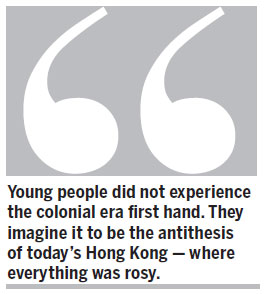Young people ignorant about colonial Hong Kong
Updated: 2014-11-05 07:30
By Lau Nai-keung(HK Edition)
|
|||||||||

I n the world in which we live these days, cold wars are every bit as real as hot ones. A "color revolution" becomes the standard protocol for regime change. Soft power is invariably stronger than hard power. In the end, the key to an issue is always the person who has the ability to dictate reality. This was made clear during the "Occupy Central" movement.
"Hong Kong citizens have enjoyed a liberal way of life, developed over 156 years of British rule ending in the July 1997 handover," Crystal Lin wrote a commentary on the causes of the "Occupy" movement published in the Asia Times.
"They enjoy political freedoms such as the freedom of thought, expression and assembly. A fundamental legacy of British rule was to instill an environment and ethos conducive to the rule of law - that is, the concept that all are equal before the law and that no one, including the government, is above the law. This is a critical distinction between Hong Kong and China's approach to governance," Lin wrote.
Lin's narrative is one that resonates well with the young people of the city. Why? Because they did not experience the colonial era first hand. They imagine it to be the antithesis of today's Hong Kong - where everything was rosy. For them, Hong Kong since the handover has been a story of decline and degradation.
Lin's narrative also resonates with many Hongkongers in their 30s and 40s. Their nostalgia is not so much about "political freedoms", which they understand is more nuanced, but about the economic success that came so easily during the 1990s.
Older people see through Lin's deception. They remember the 1967 riots, and know there is no such thing as a free lunch. At the same time, while they generally grew up poor, wars and political turmoil on the mainland put them in a unique position to help transform the city into an economic powerhouse.

The dissidents and their leaders conveniently forget many things. For example, it is worth noting that no one talks about the special branch of the royal Hong Kong police force anymore. The division was disbanded as recently as 1995, only two years prior to the 1997 handover. Before they left, the special branch's intelligence division destroyed all records "to prevent it from being transferred to Chinese hands". But those of us who lived through the colonial era remember what it meant to be followed or contacted by the special branch - so much for Lin's narrative of transparency, accountability and political freedom.
Lin makes many other sweeping statements. "Although many point to the fact that there was no democracy under British rule, there was something greater: public trust in governance." If public trust is now "greater" than democracy, Lin should consider another element that is even greater - public fear of the colonial government. We certainly trusted the colonial government: We believed that opposing the colonial government (such as occupying the streets) would have had horrible consequences.
We often believe that education will lead to emancipation. That's why people often prescribe Chinese history lessons as a cure to the current social ills. The rationale behind the suggestion is that our young people are naive and ignorant. If we lay out the objective truth, they will come to realize their errors and begin to subscribe to our worldview.
In an excellent essay titled "We Are All Confident Idiots," psychologist David Dunning shares important insights into the workings of the mind: An ignorant mind is not a spotless, empty vessel, but one that is filled with the clutter of irrelevant or misleading life experiences, theories, facts, intuitions, strategies, algorithms, heuristics, metaphors, and hunches that regrettably have the look and feel of useful and accurate knowledge.
Dunning describes an experiment where respondents - uninformed about an issue - are surveyed; their opinions were all over the place. When another group of respondents were given a balanced briefing on the issue, their views were markedly divided - and aligned with their pre-existing worldview. The research concluded that simply giving members of the public more information probably won't bring them to a shared, neutral understanding of the facts; it would simply have reinforced their existing biased views.
If the prominent psychologist Dunning is right, our current focus on information alone is wrong. As a liberal, Dunning prescribes self-doubt. However, it does seem that targeting worldviews themselves may be more effective.
The author is a veteran current affairs commentator.
(HK Edition 11/05/2014 page7)